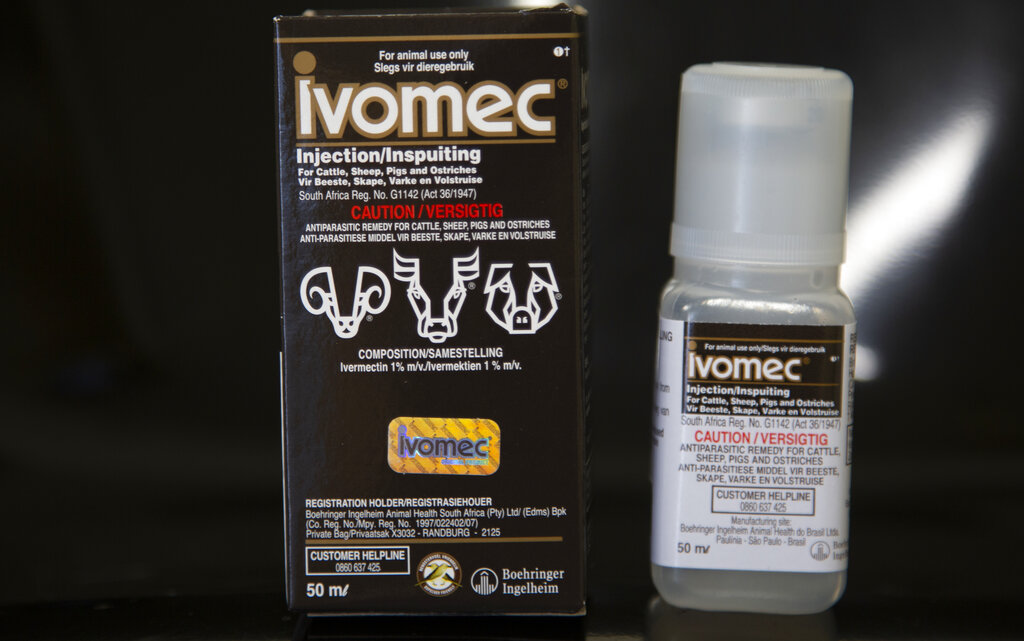
HARLINGEN — Across the Rio Grande Valley, many unvaccinated residents are turning to a potentially deadly drug used to treat livestock in a blind struggle to fight COVID-19 as the Delta variant drives cases to levels recorded during the pandemic’s height here a year ago.
Meanwhile, many doctors are prescribing the FDA-approved form of ivermectin to patients — even though it hasn’t been authorized to treat the coronavirus, Dr. James Castillo, Cameron County’s health authority, said Monday.
“These are desperation efforts,” he said.
In feed stores across the Valley and around the country, many so-called anti-vaccers are buying the form of ivermectin used to treat parasites in livestock in a mad rush to protect themselves against COVID-19.
“Do I know it’s happening all across the country and the Valley and people are selling for personal use? Yes,” said a feed store owner who asked that her name not be used because the drug is unapproved for human use.
“When someone comes in here and says, ‘I want all your ivermectin,’ I know they’re using it for personal use,” she said. “Our distributor was having trouble trying to get a hold of the product because they sell it across the country.”
Some customers blame her for COVID-19-related deaths because she won’t sell them the product, she said.
“People tell me that because I’m not selling it for human use, people are dying,” she said.
Castillo warned the drug can lead to poisoning.
“You should not be trying animal (drugs),” he said. “When drugs are made for animals; they’re not intended for humans so you can get poisoned.”
FDA issues warning
On Saturday, the drug’s alarming use led the FDA to release another alert while Mississippi health officials issued a warning after 70 percent of calls to the state’s poison control center stemmed from the use of ivermectin as the state struggled with the nation’s steepest spike of COVID-19 cases.
“FDA is concerned about the health of consumers who may self-medicate by taking ivermectin products intended for animals, thinking they can be a substitute for ivermectin intended for humans,” the FDA stated in an earlier warning.
“People should never take animal drugs as the FDA has only evaluated their safety and effectiveness in the particular animal species for which they are labeled. These animal drugs can cause serious harm in people. People should not take any form of ivermectin unless it has been prescribed to them by a licensed health care provider and is obtained through a legitimate source,” the FDA stated.
‘Off-label prescribing’
Meanwhile, many doctors are prescribing the FDA-approved form of ivermectin to patients as protection against COVID-19 — although research doesn’t show it works, Castillo said, describing the practice as “off-label prescribing.”
“There are a lot of doctors prescribing it. The people doing it are doing it without evidence of benefits,” he said.
“Doctors have been trying to repurpose already approved drugs to try to fight COVID,” Castillo said. “A lot is based on hypothesis. Now the latest is ivermectin. It’s been touted as a miracle drug. There have been studies done based on theory.”
However, the studies have failed to prove the drug works to protect against COVID-19, Castillo said.
“Some studies looked promising — it’s not panning out on well-done studies,” he said. “If this drug is so good, shouldn’t it work? It didn’t. There’s no real strong evidence that it works, that there’s benefits. It should only be used in properly conducted clinical trials.”
Vaccination rate stalled
In the Valley, some residents are turning to folk medicine in the battle against COVID-19, Josh Ramirez, Harlingen’s public health director, said.
“We hear the typical stories, depending on personal beliefs, about taking herbs or going to a curandera,” he said, referring to folk healers steeped in indigenous tradition.
Meanwhile, Ramirez and other public health officials are struggling to give hold outs of the COVID-19 vaccine in the region boasting one of the nation’s highest vaccination rates, now reaching so-called herd immunity with more than 70 percent of residents 12 and older vaccinated.
“People still have fear of the vaccine,” he said. “It is the lack of information that people have. Changing their mind has been a challenge for our staff. We’re making some progress, which is a good indication that people are beginning to listen.”
As the Delta variant drives COVID-19 cases back to the area’s pandemic height during the summer of 2020, unvaccinated patients are pushing the region’s hospitals near capacity, Ramirez said.
“More than 95 percent or higher of people in the hospital with COVID are unvaccinated,” he said. “Some of the people preaching against the vaccine are those people who are dying. Even showing people how the hospitals are full, even after telling people how many people have died, there’s still hesitation. Millions of people have been vaccinated and an extremely minute number have had side effects or reactions in comparison with the millions who have been vaccinated — and the lives that have been saved.”



